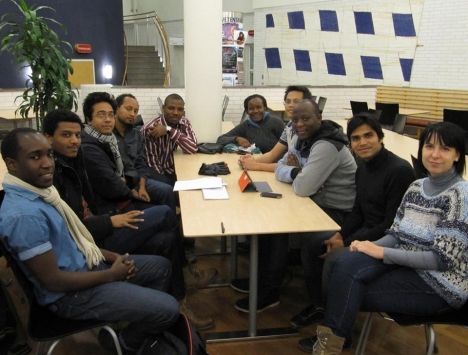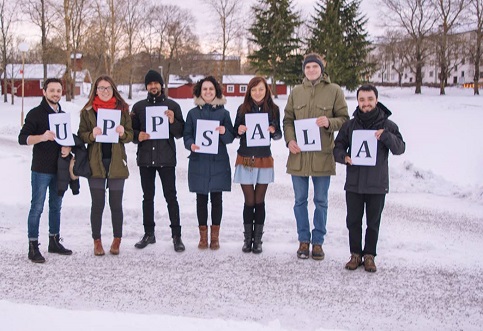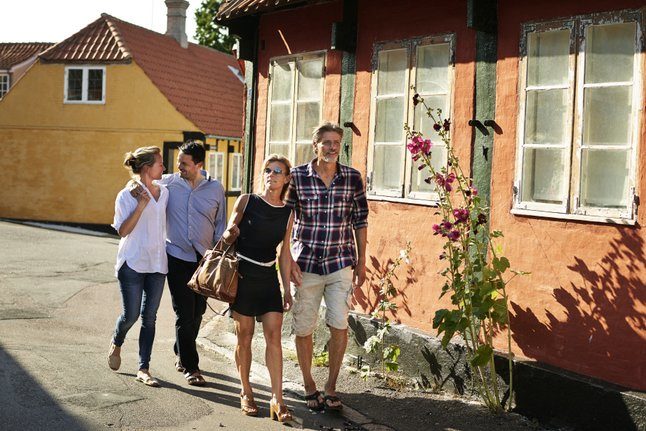Linköping – Sarah Mitchell

Sarah Mitchell knew immediately that she wanted to be part of the local Linköping network, gathering the students together for events.
“We had already met each other once before, but we were excited to have a common activity to work on as a group,” Sarah said.
The group took a democratic approach, having several meetings to discuss possible events, creating proposals, and voting on the various ideas.
The Linköping network’s first event will be a workshop on March 20th, on the topic of NGO leadership and management. Johline Lindholm, who works at Push Sverige, an organization which engages youth in sustainability, will be the guest speaker.
“She is a dynamic and inspiring young woman with much experience in this field,” Sarah said. In addition to practical guidance and advice about running an effective NGO, participants will also have the opportunity to join a brainstorm session about starting their own NGOs.
Now Sarah is one of five strong women on the board, committed to making the event a success. Hestu Rahmayani, Yelyzaveta Hrechaniuk,Tetiana Rusin, and Senjuti Das are also on the board.
Senjuti summed it up well:
“By getting involved in NFGL Linkoping, I can not only sharpen my competences gained through education but also help others become aware of diversified socio-economic and environmental issues. Thus, this opportunity can lead us one step ahead to build a better world tomorrow, giving hope to contribute more than existing only and promising a true essence of living as a whole.”
Linnaeus – Andrea Strinic

With scholarship holders from various countries, continents, and academic backgrounds, the NFGL local network at Linnaeus University is already looking forward to three diverse events this semester.
“This diversity provides wonderful stimulus for curiosity, learning, and creativity,” local leader Andrea Strinic said.
“We thought this network would also give scholarship holders a chance to take some time out of their busy schedules and connect with others, while also learning skills which could be helpful for their self development.”
Andrea said that the network aimed to organize events broad enough to suit all academic backgrounds.
The first event will focus on career paths and how to start a career or business, featuring lectures and workshops, how to apply for jobs in Sweden, and more.
“Our own scholarship holder Khalil Balan will also share the story of how he started his own business in Syria, thus giving us a peer perspective on the hurdles and joys of your own business,” Andrea said.
Of course, the Linnaeus network is not limited to Linnaeus University, Andrea added.
“We invite other scholarship holders to come share their own experiences, see a new city, and make some friends and connections. We hope to see you soon!”
Lund – Galyna Paliychuk

The Lund NFGL Network hit the ground running with a trip to Danish Parliament.
"I have a lot of fresh ideas and started to make them a reality," network head Galyna Paliychuk said. “We want to make this the most active network ever!”
The network also participates in other student events at Lund University, and meets for fika as well.
Not satisfied with just Swedish Riksdag and Danish Folketinget, Galyna is determined to really take the network places. The next trip is to Geneva in March.
"We will visit the Palace of Nations, UN committees, NGOs, and universities," Galyna said.
Other NFGL students from across Sweden were invited as well.
"We have 16 participants from Lund, Gothenburg, Jönköping, and Darlana," Galyna exclaimed. "We have the real future leaders here!"
The NFGL Lund network board includes Aleksandar Arandjelović, Adventino Banjwa, Maha Shalaby, Denis Muwanguzi, Nabila Zaman and Pascal Mutie.
Malmö – Evgeny Chavanin

Evgeny Chavanin was an active participant in student activities at the University of Iowa, where he did his Master’s.
Now in Sweden, he was keen to continue his international network-building, and pounced on the opportunity to be proactive and start a local NFGL network in Malmö.
“I sincerely hope that the network will serve as a collaboration platform for local NFGL members,” Evgeny said. “It will provide the scholars with unique opportunities to organize interesting events, exchange useful knowledge, and share plans and ideas for future career prospects.
The network is currently looking into hosting two events devoted to sustainability, social innovation, and international development. The events will be hosted at the University of Malmö, and Evgeny has already contacted potential guest lecturers.
“Overall, this will be a learning-by-doing process that will enable every participating member to grow both professionally and personally,” he said.
Göteborg – Artem Gumeniuk

NFGL students based in Gothenburg started building their network after the kick-off event in Stockholm, even before SI called for official applications.
“Many of us left Stockholm with the desire to start making steps in changing the world around us for the better,” Artem Gumeniuk, leader of the Gothenburg network, told SI News.
The team’s first step was to start getting to know each other with various activities in their free time.
“It created a very friendly atmosphere and a firm ground for building the network, from which we can learn and become excited.”
The network is planning a range of workshops, educational trips, and seminars during the semester, covering six critical areas: Innovation and creativity, entrepreneurship and career development, leadership, management and networking, sustainability, and democracy and human rights.
They also plan on having fun.
“The local SI network in Gothenburg is determined to combine learning and having fun,” Artem said.“That will hopefully result in creating enthusiasm among the network for the next generations of scholarship holders.”
Indeed, part of the network’s objective is to make sure that it’s a lifelong connection.
“We believe that, with the support of Swedish Institute, we will not only be able to reach our goals, but we will build a strong network that will stay alive even when its first members go on with their life journeys.”
Umeå – Vasili Mankevich

The Umeå network has dreams – and has concrete plans to realize them. In fact, they have outlined a mission and a strategy to reach their goals.
“Our vision is to be a network which addresses global problems through leadership, individual action, and knowledge transfer,” leader Vasili Mankevich said.
The network consists of five board members: Vasili, Fahria Kabir, Samwell Maina Gatimu, Sumaiya Hafsa, and Wossenseged Jemberie.
The team leverages local university resources in order to maximize their budget using limited resources, and also makes use of the knowledge and expertise already contained in the diverse network.
“We are planning a series of events that cover a number of topics related to the subjects of members’ programs, and the thematic areas proposed by SI,” Vasili said.
Each event will consist of an invited speaker, discussion, and Q&A, and certain events will also include a workshop.
In addition, the network will be hosting ‘Productive Fika’ sessions.
“I am personally very interested in these sessions,” board member Fahria said. “I think that having an informal platform to discuss ideas or stories with a group of experienced people is a great source for learning.”
Uppsala – Mohammad Bilal Attar

Mohammad Bilal Attar, leader of the NFGL network in Uppsala, has been part of the local network before it was even official.
“My friend, who’s one of the SI scholarship holders in Lund, contacted his friends in Uppsala to host me while I was settling down,” Mohammad explained. “So I spent the summer with NFGL members, getting to know Uppsala.”
Now that the group is official, it’s thriving more than ever, and has a long list of goals.
“Most important is that we keep the connection alive among SI scholars in Uppsala,” the leader said. “We also aim to develop our skills as international students in Sweden so we can compete in academia and on the labour market.”
The Uppsala network’s activities will cover both practical and theoretical topics. The first event, held in February, is designed to give Uppsala scholars new information about entrepreneurship and starting companies in Sweden. The next event will be a workshop focusing on the labour market and how to gain the proper work qualifications to work in Sweden after graduation.
“And for our last event, we plan to have a leadership workshop by a distinguished manager in Uppsala or Stockholm,” Mohammad said.
The team hopes that these varied events will help them grow as future leaders – and have a good time.
“What is better than mingling and having fun with the best students from all over the world?”
Örebro – Olga Mashtaler

Before the Örebro network was created, the NFGL students there were dispersed and didn’t really know each other.
Now that’s all changed.
“It is so important for international students not to feel isolated, but to be actively engaged in social activities,” network leader Olga Mashtaler said.
“Our diversity stimulates and inspires us to form such agenda-setting for our common activities that will be interesting for all members.”
During the spring semester, the NFGL Örebro network will organize five one-day seminars with various themes, such as democracy and human rights, ICT and e-solutions, sustainable development, and employment and career development.
The first event is a seminar about career development in Sweden, and will take place on February 10th.
“International students often feel a lack of information regarding employment in Sweden, so this seminar will provide us with knowledge on how to facilitate career development,” Olga said.
“We hope that our common activities will not only strengthen the ties within our local university network, but also allow us to get new efficient knowledge and experience, so that we will be able to apply them in our native countries later.”



 Please whitelist us to continue reading.
Please whitelist us to continue reading.